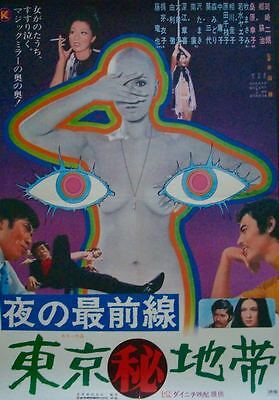 Japan’s Shun’ya Ito is best known for directing the strikingly visualized FEMALE CONVICT SCORPION series of films starring the inimitable Meiko Kaji as a tough woman prisoner. LABYRINTH OF FLOWER GARDEN (HANAZONO NO MEIKYU; LABYRINTH ROMANESQUE), an erotic noir that appeared in 1988, is another female-centered, visually rapturous thriller. It doesn’t feature Meiko Kaji, but does star the nearly-as-captivating Yoko Shimada (of SHOGUN and CRYING FREEMAN), who’s at once menacing, authoritative and sexy.
Japan’s Shun’ya Ito is best known for directing the strikingly visualized FEMALE CONVICT SCORPION series of films starring the inimitable Meiko Kaji as a tough woman prisoner. LABYRINTH OF FLOWER GARDEN (HANAZONO NO MEIKYU; LABYRINTH ROMANESQUE), an erotic noir that appeared in 1988, is another female-centered, visually rapturous thriller. It doesn’t feature Meiko Kaji, but does star the nearly-as-captivating Yoko Shimada (of SHOGUN and CRYING FREEMAN), who’s at once menacing, authoritative and sexy.
She plays the elegant madam Tae Akimoto, who runs an opulent seaside brothel. As the film opens this long-deserted structure is being torn down, with an extended flashback filling us in on a portion of its history. The time period is 1942 and the brothel is thriving. War has been launched against the US and Tae is making quite a profit servicing local soldiers, in between compulsory military drills undertaken by Tae and her female employees.
One morning a man’s corpse is discovered, submerged in an upstairs bathtub. This man happens to be the husband of Tae and the brother of Kiku, a rival madam who suspects Tae of having committed the murder in conjunction with Shosuke, the brothel’s shady boiler operator. Tae is interrogated in extremely brutal and inhumane fashion by local police officers, who among other things stick a quill pen tip under her fingernails.
Uncovered is the fact that on the night of the killing Tae was abused in her private quarters by her drunk husband, who believed she was cheating on him. He eventually passed out and Tae returned—she claims—to find him dead. Fearing she’d be blamed for the killing, Tae took some money from her safe to make it look as if the room was burgled.
The cops eventually release Tae, and she returns to the brothel a haunted woman. Also feeling apprehensive are Mitsu and Fumi, teenaged friends who work for Tae. Fumi finds Kiku dead in the brothel, after which Mitsu promptly leaps—or is thrown from—an upper floor. The now-dead Mitsu is officially branded the killer, but Fumi believes otherwise.
The brothel is shut down, following which two more people are killed. How it is that the police don’t bother to investigate these latest murders, instead leaving Tae and Shosuke the boiler man in the place by themselves, is never explained. No, the film isn’t what you’d call well plotted, but Shun’ya Ito’s talents were always in the visual rather than narrative sphere.
LABYRINTH OF FLOWER GARDEN is a fine showcase for Ito’s image making. It’s marked by smoky and diffused visuals, complementing the highly symmetrical compositions that are often framed by elegantly ordered foreground objects. Ito’s visual extravagance extends to the positioning of his props and actors, as in a third act murder on a spiral staircase that concludes with the victim being slowly dragged down the twisty stairs, and the many extended tracking shots that (some distractingly wobbly camerawork aside) never fail to impress. Also impressive is Ito’s impressionistic use of music, which often takes the place of dialogue, ambience and sound effects.
But getting back to that cluttered narrative, the whole thing is overly flashback-heavy, and incorporates fantasy/hallucinatory elements in extremely clumsy fashion. Also, the identity of the murderer, which isn’t revealed until the end, is never in much doubt.
Vital Statistics
LABYRINTH OF FLOWER GARDEN (HANAZONO NO MEIKYU; LABYRINTH ROMANESQUE)
Toei
Director: Shun’ya Ito
Screenplay: Hiro Matsuda
(Based on a novel by Yoko Yamazaki)
Cinematography: Daisaku Kimura
Editing: Isamu Ichida
Cast: Yoko Shimada, Yuya Uchida, Yuki Kudo, Hitomi Kuroki, Tatsuo Nadaka, Kyoko Enami, Akira Nakao, Kyoko Tsujisawa, Mami Nomura
